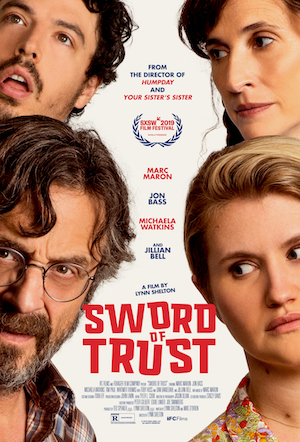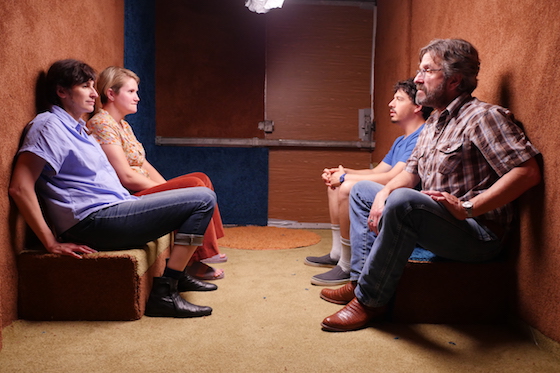

[Rating: Solid Rock Fist Up]
A story about stories and myths people conjure up to make sense of a world that feels increasingly senseless, Sword of Trust slices with a sharpness that one might not expect: transcending the situation comedy elements that make up the backbone of the narrative. Set in present-day Alabama, the film follows a pawnshop owner through a handful of days as he negotiates the sale of an antique, and touches on the ways people connect, communicate, and myth-make. And while it sometimes teeters between farcical and tragic, it never dips too far in either direction, and instead maintains its balance to offer up something that’s both genuine and entertaining.
When Sword of Trust opens, Mary (Michaela Watkins) and her partner Cynthia (Jillian Bell) are walking through the home of the latter’s deceased grandfather. Although they’ve come to town hoping for a payout, they’re disappointed to learn that the old man had to reverse mortgage the house, and Cynthia’s only score from the estate is an old Civil War-era sword. This isn’t just any sword, though, it comes with questionable (batshit crazy) paperwork that attests to its historical value as an artifact of the REAL war between the states…the one where the south was victorious.
Rather than disregard the paperwork as the demented fantasy of a senile old man, Mary and Cynthia take it to a local pawnshop, where they hope the owner, Mel (Marc Maron), is crazy enough to buy into it all. Mel isn’t stupid, though; jaded, maybe, but not stupid. But Mel’s one employee, Nathaniel (Jon Bass), is a conspiracy-mad YouTube enthusiast, and convinces Mel that there’s enough crazy in the world to make a nice little profit off the sword. This sends Mary, Cynthia, Mel, and Nathaniel down a curious online path, one populated by WhatsApp, Civil War truthers, and the ghosts of all four’s pasts.

Light in its tenor, and shot and costumed with bright tones, writer/director Lynn Shelton keeps the whole affair breezy, and set in a safe space. Although the narrative sends these characters on a somewhat whacky journey that speaks to the insanity of America’s current social and political climate, one where racist conspiracy theories thrive, and the elderly need to borrow against their assets just to survive old age, it never gets too dark. Sword of Trust is a character piece, first and foremost, and as the film moves into its second act, the movie becomes less about Cynthia’s weird inheritance, and more about the myths people conjure up to make sense of the world.
Mel is a broken man, held together by the pieces of tape that he’s wrapped around himself following a shattering relationship with an -ex he can’t quite shake. A scene early in the picture, where Mel has to interact with this former lover, Deirdre (Shelton, in a sorta-cameo), lays his wounds bare, and tells the audience everything they need to know about the man. Likewise, Cynthia and Mary share a past that aligns more acutely for them than their future, and despite the things they tell each other, it’s clear that they have different ideas about what is in store for them down the road.
Like the racist idiots online who convince themselves of an alternate history that aligns with their awful worldview, Mel, Cynthia, Mary, and Nathaniel are all living in different levels of fantasy of their own creation. People tell themselves that they have gotten over an -ex despite the fact that they aren’t, just as those in relationships convince themselves that something is fine when it isn’t. Whether it is an idiot talking about how the world is really flat, or a partner explaining that their companion’s worst impulses really aren’t that bad, humans can’t help but to create false realities to line up what is with what they hope or think should be.

Maron, though plenty experienced in front of the camera, is a real surprise in Sword of Trust, where he turns in a performance full of subterranean angst and nuance. Fans that are only familiar with the man from his interviews and podcast might be surprised to find a genuine, layered performance, here, where he’s forced to carry much of the thematic weight of the picture, and never shows any signs of buckling. Bell likewise plays somewhat against type, and while she keeps things light, doesn’t fall back on her comedy roots to propel her character forward. Funny as the whole thing is, Sword of Trust lives and dies by its characters and their unspooling, and the script gives them all enough slack to develop into textured, believable participants in the story.
Indeed, if there’s any failing in the picture, it comes as the third act tries to tie a bow on all of the sword selling comedy, which just barely survives the obstacle course the script puts it through. It all works, logic-wise, but one gets the sense that Shelton painted herself into a bit of a corner, and only through sheer skill and force of will managed to tie up all the loose ends of this one. Again, though, it all works, and despite one particular whacky detour near the end, it all comes together. Opening today, Sword of Trust is a fun, funny, and touching trifle with well-painted characters and a surprising amount of insight into modern myth-making in the era of alternate facts. And while it isn’t always as sharp as it could be, Sword of Trust consistently cuts deep.





Comments on this entry are closed.